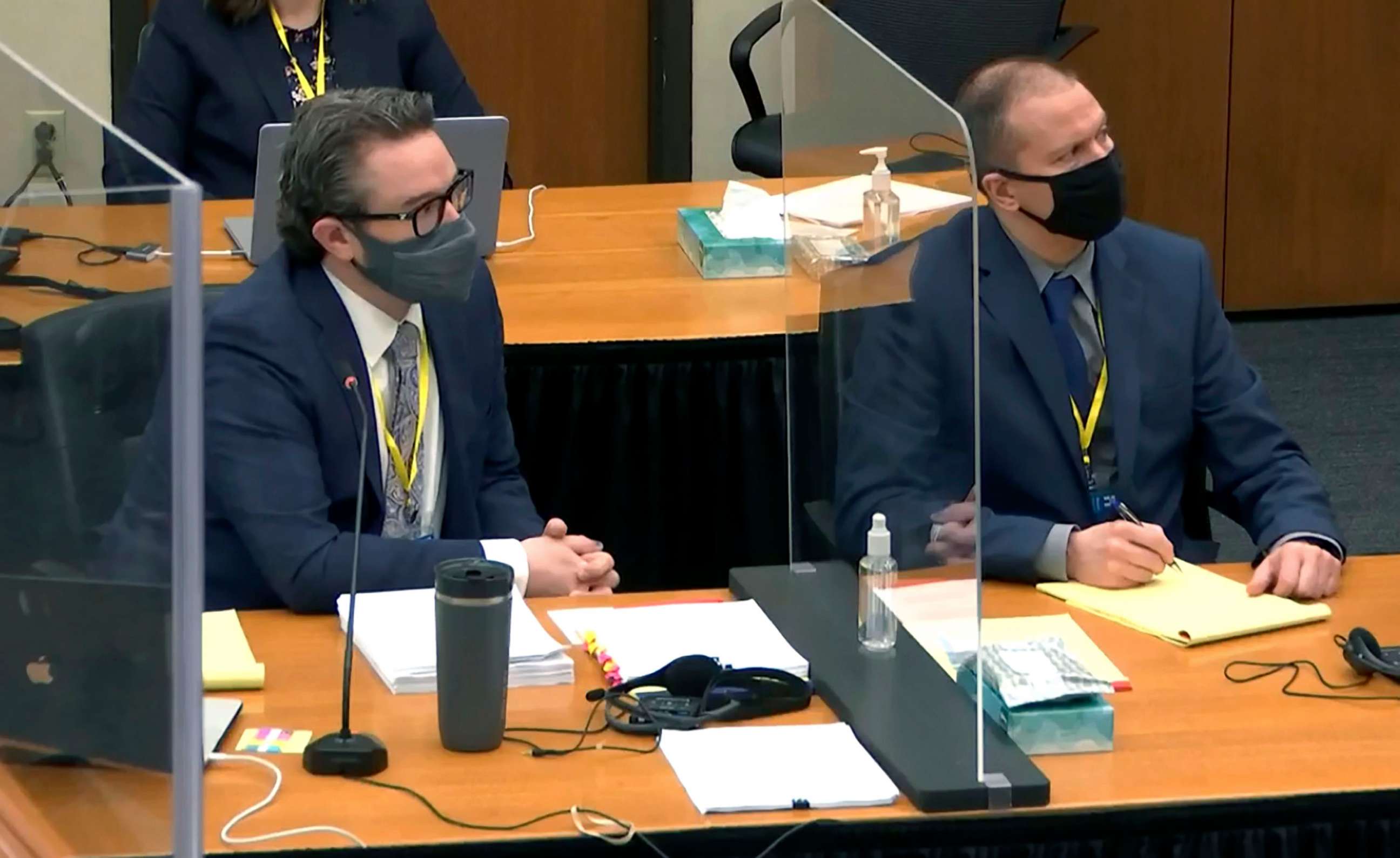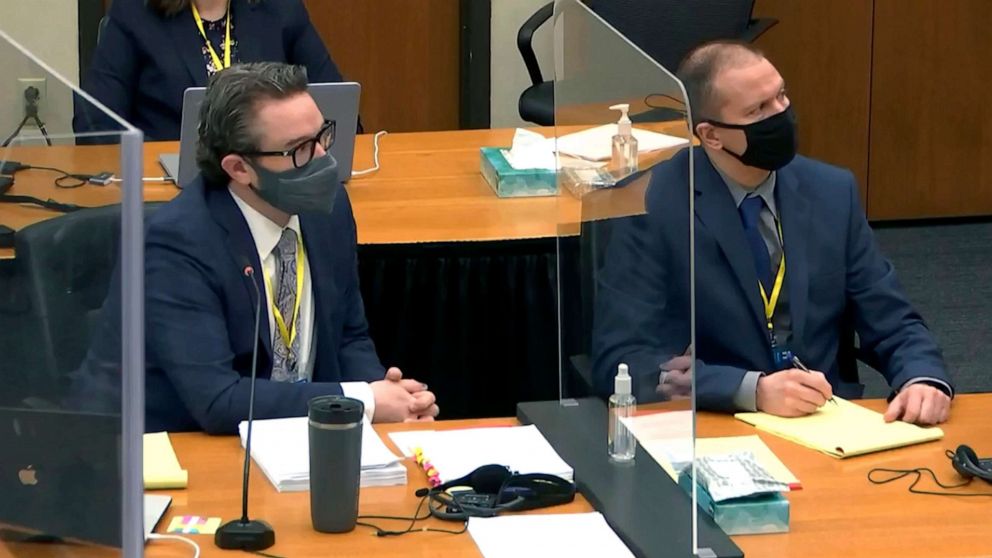Judge reinstates 3rd-degree murder charge against Derek Chauvin in death of George Floyd
The judge presiding over the trial of former Minneapolis police officer Derek Chauvin in the death of George Floyd has reinstated a third-degree murder charge in the case after the Minnesota Court of Appeals ruled that the application of the count in another civilian death involving a Minneapolis police officer established precedent.
Hennepin County District Court Judge Peter Cahill, who dismissed the third-degree murder charge in October, granted the motion by prosecutors to reinstate the charge after hearing arguments from both sides of the case.
Cahill's decision hinged on a recent appellate court decision upholding a third-degree murder conviction against former Minneapolis police officer Mohamed Noor in the 2017 fatal shooting of Justine Ruszczyk Damond after she called 911 to report an assault in progress near her home.
"With regard to the state's motion to reinstate, the court is going to grant the motion," Cahill said before the third day of jury deliberations began.
Cahill said that he initially disagreed with the appellate court's decision in the Noor case.

"I denied the motion initially because of my disagreement, but not without first checking to see if I was duty-bound to follow it as precedent," Cahill said. "Now, based on the defendant's appeal, the Court of Appeals has made it very clear: Yes, I was bound from the moment the appeal was filed. And I accept that."
Chauvin, 44, also has been charged with second-degree unintentional murder and second-degree manslaughter. He has pleaded not guilty to the charges.
Prior to the Feb. 1 Appeals Court decision in the Noor case, a third-degree murder charge in Minnesota only applied if the defendant's actions endangered more than one person.
Chauvin's attorney's filed a petition asking the Supreme Court to review the appellate decision, contending it did not apply to Chauvin's case because the former officer is accused of targeting only Floyd. The petition prompted prosecutors in the case to ask the appeals court to halt jury selection, contending Cahill did not have total jurisdiction as long as Supreme Court was considering Chauvin's request.
Despite the petition from prosecutors on Monday to stay the trial, Cahill ruled that he was moving on with jury selection until the appeals court told him otherwise, which it never did.
The Supreme Court on Wednesday rejected Chauvin's petition, putting the decision on the third-degree murder count back on Cahill.
"The court of appeals has said in a precedential opinion specifying the single-person rule applies to third-degree murder. I feel bound by that and I feel it would be an abuse of discretion not to grant the motion," Cahill said.
Prior to the ruling, Chauvin's lawyer, Eric Nelson, presented an unsuccessful last-ditch argument on why he believed the third-degree murder should not be reinstated. Nelson contended that the Noor case was procedurally and factually different than the Chauvin case.
"If you look at the facts of Noor, it's a Minneapolis police officer. This is a case involving a former Minneapolis police officer and that's about where the similarities end," Nelson said.
He said Noor was inside a patrol car with his partner and fired a gun across his partner's chest at a silhouette outside the vehicle that turned out to be Ruszczyk Damond, an "inherently dangerous" action that jeopardized anyone in the line of fire, including a bicyclist who was riding by at the time. He cited other cases to support his argument, saying they all include some form of instrumentality, whether it be a gun or a vehicle used to run someone over.
"Factually, there is no instrumentality here other than arguably Mr. Chauvin's knee," Nelson said.
He argued the cases are also procedurally different because Noor's appeal was filed after his conviction, and the Cauvin case is still in a pre-trial phase.
The prosecution's key evidence in the case against Chauvin is a bystander video of the May 25 arrest in which Chauvin, who is white, is seen kneeling on the back of Floyd's neck for more than nine minutes as the handcuffed and prone Black man repeatedly cried out, "I can't breathe."
Attorneys Ben Crump and Antonio Romanucci, who represent the Floyd family, applauded Cahill's decision.
"We're gratified that the judge cleared the way for the trial to proceed and for Chauvin to face this additional charge," Crump and Romanucci said in a statement. "The trial is very painful and the family needs closure. We're pleased that all judicial avenues are being explored and that the trial will move forward."
The circumstances of Floyd's death prompted weeks of protests in Minneapolis and across the nation, some of which were accompanied by violent clashes against police, looting and vandalism of businesses.
Like many people across the country, President Joe Biden is closely monitoring the Chauvin trial, White House press secretary Jen Psaki said on Thursday. She said Biden has no intention of weighing in on the criminal case, but added the president has previously spoken about racial justice and his support of police reform.
"He's watching it closely, as are many members of the administration," Psaki said.
Chauvin is being tried separately from three other former officers involved in Floyd's death. J. Alexander Kueng, Thomas Lane and Tou Thao are charged with aiding and abetting second-degree murder and manslaughter and are scheduled to go on trial in August. All three have pleaded not guilty to the charges.
After the issue of the third-degree murder was settled, jury selection resumed, with the sixth juror seated on Thursday.
The latest member added to the panel is a man who works as a route driver, who described himself as Real Madrid soccer fan who enjoys true crime podcasts. He said it was "mind-blowing" to receive a jury summons in such a big case.
Attorneys said they're looking to select 14 jurors for the case, including two alternates.
ABC News' Whitney Lloyd contributed to this report.




